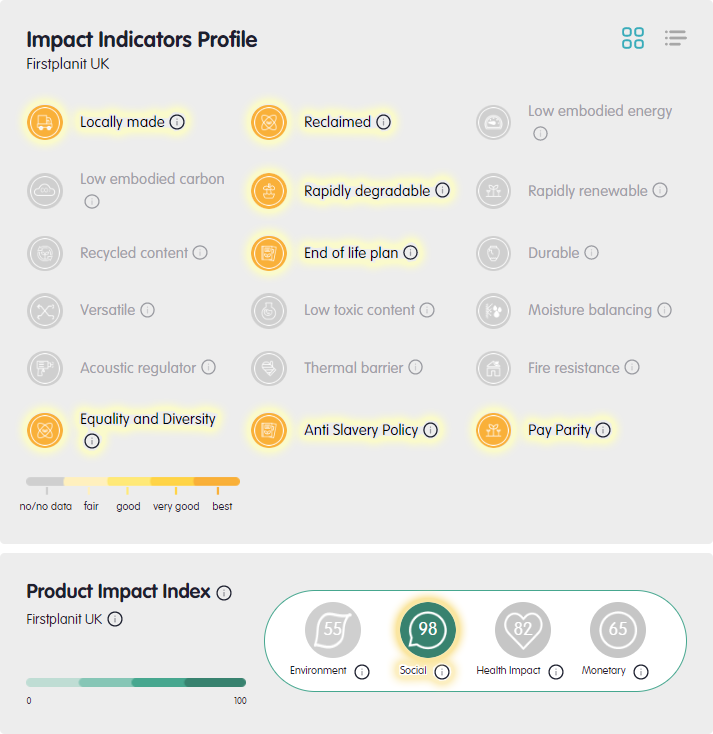How Firstplanit evaluates the social performance of a product
Firstplanit provides data analysis to enhance the sustainability of building projects. Among its features are product scores that evaluate the potential sustainability of construction materials based on their Environmental, Social, Health, and Monetary (ESHM) impacts. At Firstplanit, we assess 18 unique impact attributes that correspond to one or more ESHM benefits. The Product Scores’ value is calculated based on the product performance on the relevant impact attributes.
This series of articles will delve into the definition and evaluation of each attribute and the specific environmental, social, health, and monetary impacts they align with. This article will concentrate on the social impact; 7 of the 18 attributes influence the social score of the product.

The Social Score reflects the impact of choosing this product on society. This includes social issues such as fair working conditions, human rights, supporting the local economy and reducing the impact of waste on society.
- Companies that engage and embrace equality and diversity and support fair and equal pay help to contribute to the improvement of working conditions.
- Implementing anti-slavery policies demonstrates a company’s alignment with addressing human rights issues.
- The consumption of locally made products directly supports the local economy through investment and jobs.
- Products that are reclaimed, rapidly degradable or have an end-of-life plan help to mitigate the impact of waste and landfill, directly improving living conditions.
Locally made
Definition: Products extracted or manufactured using resources available within a defined distance from the project site are considered locally made.
The location of manufacturing units matters as some manufacturers could be distributing in the region but manufacturing far away in another country, this does not qualify as locally made.
Cut-off Criteria: The manufacturer declares that the product is made within the project’s country of origin.
Reclaimed
Definition: Products that have been previously used in buildings, temporary works , or other projects are then either slightly altered, re-sized, refinished, or adapted to be used again are considered reclaimed.
(Not recycled or reprocessed in any way.)
Cut-off Criteria: Manufacturer claim or evidence that the product is a second-hand product – it has not undergone any major alterations in order for it to be reused.
Rapidly degradable
Definition: Products that can be quickly broken down into biomass or simpler molecules by biological organisms and processes are considered rapidly degradable. Everything is biodegradable, but chemical treatments and coatings used to increase durability will often resist degradation, hanging around as waste for hundreds of years beyond their intended use timeframe.
Cut-off Criteria: 75% of the product mass must biodegrade rapidly, i.e. within 40 years. The process of biodegradation must not create harmful and toxic residues.
End of life plan
Definition: The product’s manufacturer has a plan for the material at the end of the product’s first use. This could be a take-back policy or collaborative programs with the local government or 3rd parties to ensure the collection of discarded products for recycling, refurbishment. Note that recyclability is not an end-of-life plan, but a plan in place to collect and send the product for recycling is an end-of-life plan.
Cut-off Criteria: The manufacturer independently or collaboratively has:
(a) laid out a plan for responsible reuse or recycling of the material at the end of life and shared it with the user and
(b) made provisions for collecting products at the end of their life, followed by, recycling or refurbishment, declaring how much and what is done.
Equality and Diversity
Definition: Manufacturers that provide equal opportunities for their employees and recognise, respect and value the difference of their workforce. Companies must offer equal opportunities to all, irrespective of age, sex, disability, race, ethnicity, origin, religion, economic or other status.
Cut-off Criteria: We evaluate the public disclosure of manufacturers provided in company reports regarding Equality and Diversity in the workplace based on Diversity, Equity and Inclusion standards, frameworks, and UN’s targets.
Anti Slavery Policy
Definition: Manufacturers must not tolerate modern slavery in any form, this encompasses slavery, forced and compulsory labour, human trafficking or any other act that deprives a person’s liberty in order to exploit them for personal or commercial gain.
Cut-off Criteria: We evaluate the public disclosure of manufacturers provided in company reports regarding Ant-slavery policies and their alignment with international agreements, standards, and UN’s conventions on modern slavery.
Pay Parity
Definition: Manufacturers must demonstrate a commitment to paying people equitably, ensuring equal pay for work of equal value. Employees in the same job and location are paid fairly regardless of race, gender, sexuality or any other identity.
Cut-off Criteria: We evaluate the public disclosure of manufacturers provided in company reports regarding Pay Parity in the workplace based on pay parity laws, coalitions and frameworks around the world.
Product scores are intended to give a holistic understanding of complex interrelated sustainability impacts for each material on our database. These scores are available from the product evaluation page. To learn how to navigate and interpret this feature check out our how to guide for this feature.
